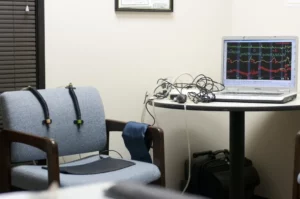The theory behind polygraph testing is that deceptive answers will produce physiological responses that can be distinguished from truthful answers.
However, these physiological signals can also be affected by anxiety, nervousness, and stress. So if you experience significant anxiety, it can potentially lead to inaccurate results and polygraph failure even if you are telling the truth.
Why Anxious Individuals Struggle With Polygraph Tests

There are a few key reasons why high anxiety is kryptonite for polygraph testing:
- The polygraph focuses on physiological arousal – Polygraph tests measure changes in breathing, sweating, heart rate and blood pressure. But these are all things that also change when you’re anxious and stressed. So it can be difficult for the polygraph examiner to distinguish between “anxiety arousal” and “deception arousal”.
- Anxiety causes similar physical responses – When you’re anxious or stressed during the test, your body will show many of the same physical signs – increased heart rate, sweating, change in breathing pattern – that are interpreted as deception. Your anxiety can mimic and mask responses.
- Anxious behaviors can appear suspicious – Fidgeting, avoiding eye contact, nervous facial expressions and tense body language are common anxiety behaviors. But they can also look like signs of lying to the examiner.
- Anxiety makes it harder to relax and focus – Polygraphs require you to listen carefully to questions and control your physical reactions. Anxiety makes it much more difficult to relax and concentrate on the test.
When you add up all these issues, it’s easy to see why polygraphs pose major problems for anxious individuals. Your anxiety produces signals and behaviors that can be misleading and inaccurate.
Tips to Manage Anxiety Before a Polygraph Exam
Here are some tips:
1. Practice relaxation techniques
- Deep breathing exercises, progressive muscle relaxation, and meditation are all great options. Set aside time each day in the weeks before the test to practice these techniques. They will help lower your overall anxiety.
2. Get plenty of sleep
- Being sleep deprived leaves you much more vulnerable to anxiety. Make sure you’re getting 7-9 hours of sleep in the nights leading up to the polygraph.
3. Avoid caffeine and other stimulants
- Caffeine, energy drinks, and other stimulants will ramp up your anxiety symptoms. Avoid them completely in the 24 hours before the polygraph.
4. Speak to the examiner
- Before the actual test, explain that you tend to be anxious about evaluations and performance-based tests. Most examiners will do things to help put you at ease if they know ahead of time.
5. Exercise regularly
- Maintaining an exercise routine lowers stress hormones and helps manage anxiety in the long run. Get regular exercise in the weeks before the test.
6. Be well-rested
- Fatigue and low energy will exacerbate anxiety. Make sure you’re eating healthy and getting enough sleep leading up to the test day.
Case Examples of Anxiety Causing Polygraph Failure

To really illustrate how problematic anxiety can be for polygraph exams, let’s look at two real-world examples:
The stressed law student
Tim was a law student interviewing for a summer internship at a prestigious law firm. As part of the interview process, he was asked to take a polygraph test.
Tim had always struggled with test anxiety throughout his academic career. The night before the polygraph, he had trouble falling asleep. The morning of, he felt nauseous and on edge.
During the actual test, Tim’s heart was racing and his hands trembled slightly. He breathed rapidly and his muscles stayed rigidly tense.
Unsurprisingly, the examiner concluded that Tim was displaying clear deception signals in response to relevant questions. Despite telling the truth, Tim failed the polygraph. His intense anxiety had skewed the results.
The anxious public servant
Maria worked for a government agency and was scheduled to take a routine counterintelligence polygraph screening. In the past, Maria had failed polygraph tests for other agencies due to her severe anxiety.
The night before, Maria felt a panic attack coming on. She tried to calm down with breathing exercises but started hyperventilating. The morning of, she felt dizzy and her mind went blank.
During the test itself, she sweated profusely and gasped for breath between questions. Her heart pounded in her ears. She fidgeted constantly in the seat.
The physiological reactions that Maria’s anxiety was causing made it impossible for the examiner to detect truthful responses. Once again, anxiety resulted in an inaccurate polygraph failure.
Tips If You’re Prone to Anxiety
If you know you’re predisposed to anxiety, especially in evaluative settings, don’t lose hope. Here are some tactics to help you stay calm and potentially pass:
- Explain your situation – Before the test begins, explain that you have very high anxiety in test situations. Most examiners will work with you to help reduce anxiety.
- Focus on your breathing – Between questions take long, slow breaths. This gives your mind something calm to focus on.
- Listen closely – Concentrate completely on the wording of each question. Don’t let your mind wander.
- Tense and release muscles – Subtly tense and release muscles to work out nervous energy. Often examiners will want your arms and hands relaxed.
- Be honest – Lying produces stronger anxiety reactions that amplify test errors. Truthful answers give you the best chance.
- Retake if needed – If anxiety leads to initial failure, ask about retaking after treating anxiety. Some examiners allow retests.
With the right strategies and professional help for anxiety if needed, it is possible to pass a polygraph test even if you are an anxious person. Don’t let anxiety tricks ruin your chance to produce honest results.
Why Polygraph Tests Are So Challenging for Anxious People
Polygraphs rely on the assumption that lying produces unique physiological responses. But the reality is that the stress of any evaluative situation can result in similar arousal.
This makes accurate testing difficult for the significant percentage of people that experience stress issues and nervousness during evaluations.
Anxiety sufferers often display the physical signs that polygraph tests focus on, like increased heart rate, sweating, changed breathing patterns, and fidgeting. This leads to many false positives and polygraph failures.
Until better, less subjective testing alternatives are found, anxiety prone individuals will continue to struggle with passing polygraph exams. Managing anxiety through the techniques discussed is key to improving your chances.
Key Takeaways
- Anxiety causes similar bodily responses to lying which can lead, in some cases, examiners to misjudge truthful answers as deception.
- Physical anxiety symptoms like increased heart rate and sweating, along with anxious behaviors, are easily misread.
- Controlling anxiety through relaxation techniques, visualization, proper preparation, caffeine avoidance, and physical release of tension can help.
- Polygraph failure due to anxiety is common even for completely honest test takers. Retesting after anxiety treatment may be an option.
- Until better alternatives exist, managing anxiety is critical for increasing the chances of passing for anxiety-prone individuals.



